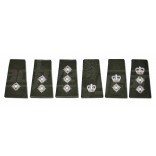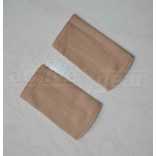Details
The lanyard has its origin in the utilitarian purpose of keeping an item close to hand. In other words, it attached an item such as a sword, pistol, bugle or whistle to the body of the owner. This was particularly true of Cavalry; it was inconvenient for a cavalryman to dismount in a melee to retrieve his dropped sword or pistol, just imagine in the heat of battle, an officer dismounts his horse and invites the enemy to halt the conflict because he lost his sword or pistol. That situation would be more than tragic and therefore the lanyard played more than a cursory decorative role in early warfare. You can still see them in use for this purpose as late as World War II, British officers had lanyards attached to their whistles and pistols. In the American forces and in most military police units around the world they are still authorized for that purpose. In fact, up until the late 2000s, it was common to see the members of the JDF provost unit attach a lanyard of some sort to their standard issue 9MM Browning. Lanyards today probably evolved from the braid festooned uniforms of the Napoleonic period. The Cuirassiers had braid connecting their swords to their shoulders, that way they would not interfere with the use of it but keep it attached to them. Today the lanyard is more used as a badge of distinction, qualification or award. The Canadians and Americans authorize the wear of different colored lanyards in dress and service (Canadian only) uniform to distinguish units or branch of service. The Austro-Hungarians authorized it as a badge of qualification, such as gunner or marksman. The French give multicolored lanyards as awards.
Many European monarchies made lanyards part of a unit award such as the Military Order of William of Orange which originated in 1815. A regiment was awarded an orange streamer for heroism to attach to the regimental colors and the senior officers of that regiment a Knights cross with orange and white enamel on the badge and all the other members of the regiment an orange lanyard. In the English Army, The Royal Engineers lanyard is navy blue and worn on the right shoulder. Since 19th century plain lanyards were used for securing the jackknife which was issued to all mounted troops. It was intended to be worn around the waist but soldiers soon found it to be more convenient to wear it on the shoulder with the knife in the breast pocket. The Royal Engineers, as did other corps and regiments of the British Army, introduced the lanyard to brighten up their battledress uniform in 1951.
Here in the Caribbean, we have the twisted and plain lanyards in various colours of defence and cadet forces. The Jamaica Defence Force (JDF) wears a black or navy blue lanyard. Point to note that the Workshop Unit of the JDF wears a red lanyard. The Barbados Defence Force wears a yellow twisted lanyard. Trinidad and Tobago Defence Force wears green twisted and plain green lanyards. However it must be noted that in the Trinidad and Tobago Defence Force, it is also worn over the right shoulder. Guyana Defence Force also wears a red plain lanyard. Most of the forces wear the lanyard over the left shoulder.
Additional Information
| size | N/A |
|---|
You may also be interested in the following product(s)
-

Olive Green Rank Slides
$11.99 -

Khaki Rank Slides
$2.49



